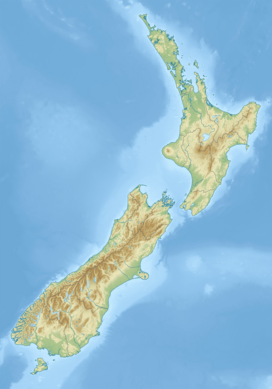Mount Bonpland
| Mount Bonpland | |
|---|---|
 Northeast aspect | |
| Highest point | |
| Elevation | 2,343 m (7,687 ft)[1][2][3] |
| Prominence | 1,167 m (3,829 ft)[2] |
| Isolation | 18.42 km (11.45 mi)[2] |
| Coordinates | 44°49′35″S 168°16′45″E / 44.826508°S 168.279138°E[2] |
| Naming | |
| Etymology | Aimé Bonpland |
| Geography | |
 | |
| Interactive map of Mount Bonpland | |
| Location | South Island |
| Country | New Zealand |
| Region | Otago[4] |
| Parent range | Southern Alps Humboldt Mountains[3] |
| Topo map(s) | NZMS260 E41[4] Topo50 CB09[3] |
| Climbing | |
| First ascent | 1894 |
Mount Bonpland is a 2,343-metre-elevation (7,687-foot) mountain in Otago, New Zealand.
Description
[edit]Mount Bonpland is the highest peak in the Humboldt Mountains which are a subrange of the Southern Alps on the South Island.[1][3] It is located nine kilometres west of the settlement of Glenorchy. Precipitation runoff from the mountain's slopes drains east into Glacier Burn which is a tributary of the Dart River / Te Awa Whakatipu, and west to Caples River, with both rivers emptying shortly thereafter into Lake Wakatipu. Topographic relief is significant as the summit rises 2,030 metres (6,660 feet) above the lake in six kilometres, and 540 metres (1,772 feet) above Bryant Glacier in 0.5 kilometre. The nearest higher peak is Mount Christina, 18.5 kilometres to the west.[5] This mountain's toponym was applied by James McKerrow to honour Aimé Bonpland (1773–1858), a French explorer and botanist who traveled with Alexander von Humboldt in Latin America from 1799 to 1804.[4] The first ascent of the summit was made in 1894 by W.J.P. Hodgkins and E. Bryant.[3]
Climate
[edit]Based on the Köppen climate classification, Mount Bonpland is located in a marine west coast climate zone.[6] Prevailing westerly winds blow moist air from the Tasman Sea onto the mountain, where the air is forced upwards by the mountains (orographic lift), causing moisture to drop in the form of rain and snow. This climate supports the Bryant Glacier on the east slope of the peak. The months of December through February offer the most favourable weather for viewing or climbing this peak.[7]
Climbing
[edit]Climbing routes:[3]
- East Face
- East Face Direct
- East Face – North Ridge
- West Ridge
See also
[edit]Gallery
[edit]References
[edit]- ^ a b Mount Bonpland, Otago, NZTopoMap, Retrieved 9 January 2025.
- ^ a b c d "Mount Bonpland, New Zealand". Peakbagger.com. Retrieved 9 January 2025.
- ^ a b c d e f Mt Bonpland, New Zealand Alpine Club, Climbnz.org, Retrieved 9 January 2025.
- ^ a b c Mount Bonpland, New Zealand Gazetteer, Retrieved 9 January 2025.
- ^ "Mount Bonpland, Peakvisor.com". Retrieved 9 January 2025.
- ^ Te Anau Climate (New Zealand), climate-data.org, Retrieved 9 January 2025.
- ^ The Best Time to Visit the South Island, nzpocketguide.com, Retrieved 9 January 2025.
External links
[edit]- Mount Bonpland: weather
- Mount Bonpland: New Zealand Alpine Club



